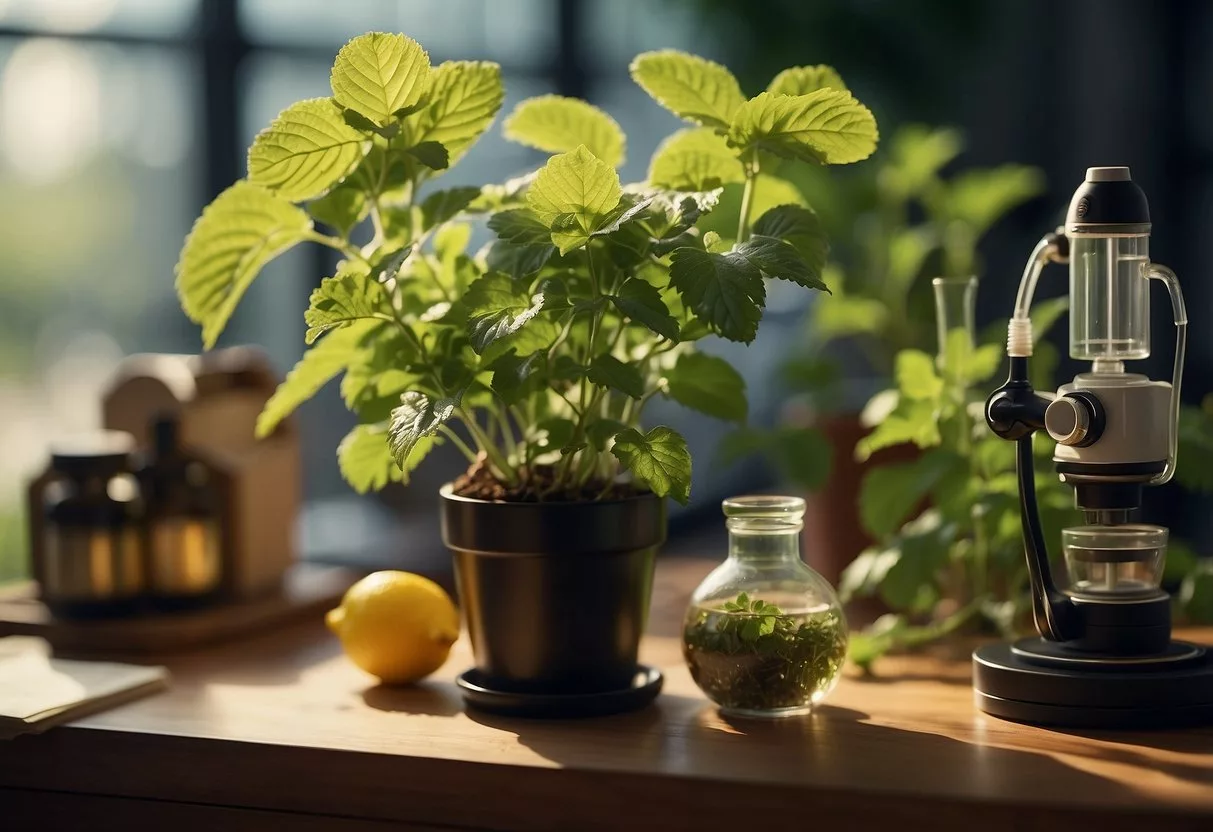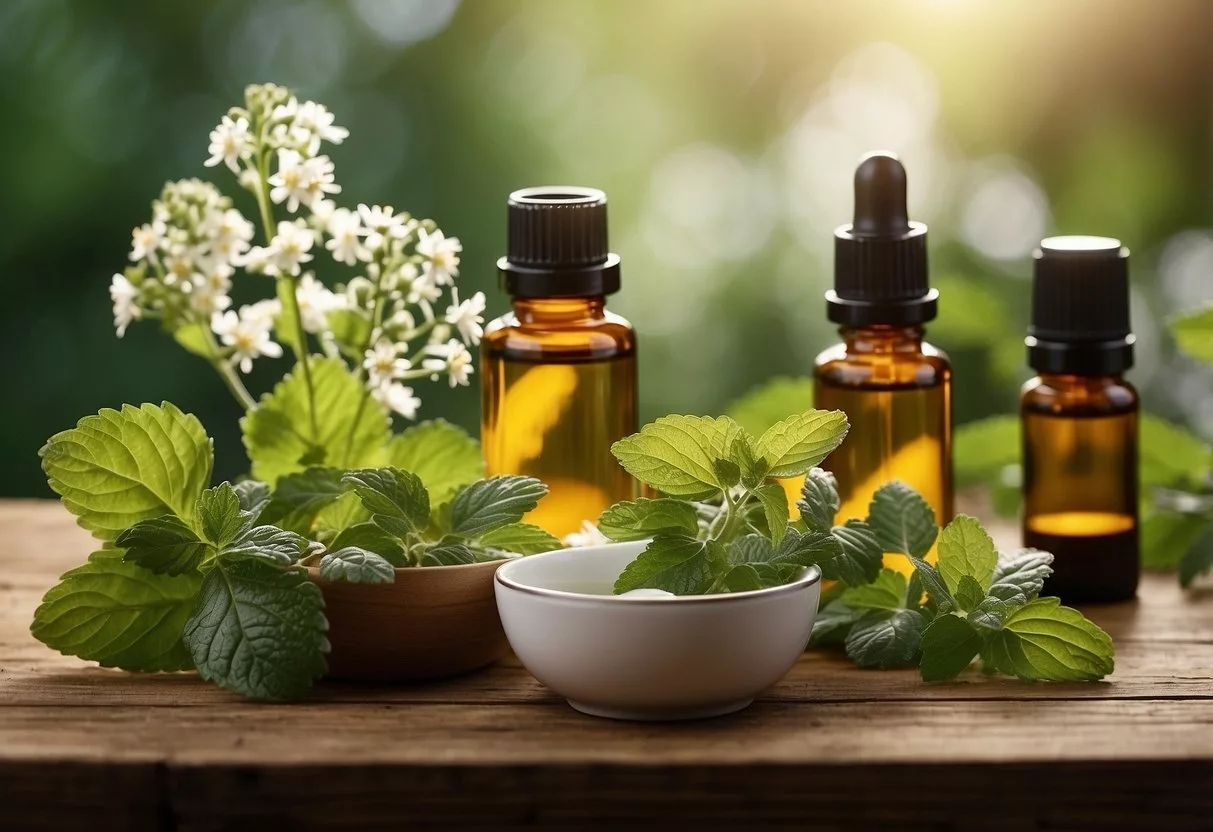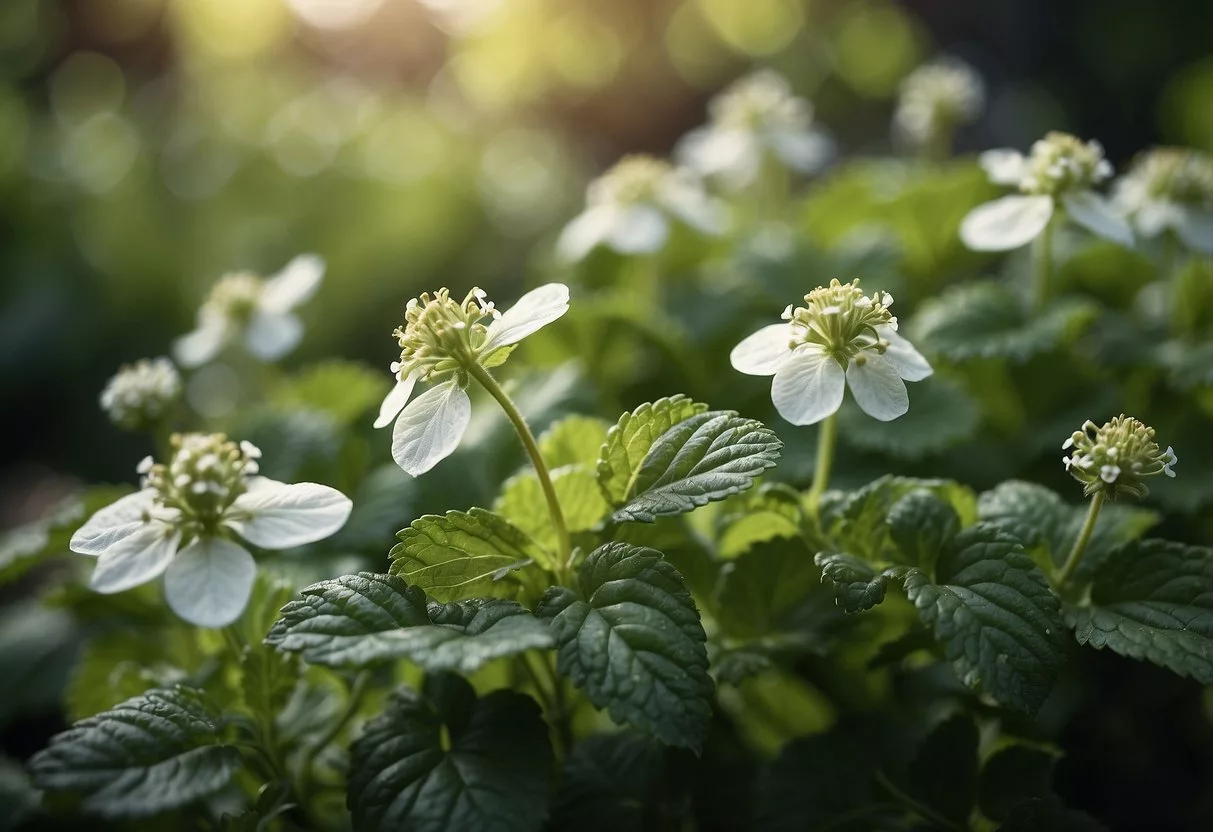Lemon balm, also known as Melissa officinalis, is a fragrant herb from the mint family that has been used for centuries for its calming and medicinal properties. Whether consumed in teas, capsules, or applied as an oil, this versatile herb offers numerous health benefits. Lemon balm is renowned for its ability to reduce anxiety, improve sleep quality, and boost mood.
In addition to its calming effects, lemon balm is praised for its potential to aid digestion and alleviate symptoms of an overactive thyroid. It’s not just for internal use; lemon balm is also popular in aromatherapy and skincare routines due to its soothing properties. From teas to lotions, its applications are vast and varied, making it a staple in both traditional and modern natural remedies.
For those interested in incorporating lemon balm into their daily lives, it can be grown easily in home gardens or obtained through various commercial products. It’s a gentle yet effective herb with a long history of use, providing both health and culinary benefits.
Key Takeaways
- Lemon balm reduces anxiety and improves sleep.
- It has digestive benefits and thyroid regulation properties.
- Commonly used in teas, oils, and topical applications.
Historical Significance and Origin

Lemon balm has a rich history that dates back over 2,000 years. It was highly valued in Europe for its medicinal properties and played a significant role in traditional remedies.
Background in Europe
Lemon balm, known scientifically as Melissa officinalis, is native to the Mediterranean region and Western Asia. It was a popular herb in ancient Greek and Roman societies. The Greeks referred to it as “Melissa,” meaning “bee,” due to its appeal to honeybees. Historical texts, such as those by Pliny the Elder, mention lemon balm for its beneficial properties.
In medieval Europe, lemon balm became a staple in monastic gardens. Monks used it to make medicinal beverages and soothing balms. Culinary uses were also common, with lemon balm adding flavor to dishes and drinks.
Traditional Medicine Use
Traditional medicine has long recognized the therapeutic value of lemon balm. Its antiviral and antibacterial properties made it a go-to remedy for treating wounds and skin conditions. Herbalists would often use it in the form of oils, salves, and poultices.
In addition to its topical uses, lemon balm was highly regarded for its calming effects. It was used to relieve stress, anxiety, and insomnia. Modern studies continue to explore its potential benefits for mental health. For more detailed information, consider this resource on the ancient practice of lemon balm.
Pharmacology and Active Compounds

Lemon balm, scientifically known as Melissa officinalis, is known for its numerous medicinal properties. These benefits largely come from its complex chemical composition and potent antioxidant activities.
Chemical Components
Lemon balm contains several bioactive compounds. Among the most notable are rosmarinic acid and various flavonoids. Rosmarinic acid is a phenolic compound known for its anti-inflammatory and antimicrobial properties. It plays a crucial role in the plant’s medicinal applications.
Flavonoids present in lemon balm include quercetin, luteolin, and apigenin. These compounds contribute to the plant’s health benefits by providing antioxidant and neuroprotective effects. Essential oils, primarily composed of citronellal, geraniol, and neral, add to the therapeutic properties.
Antioxidant Properties
The strong antioxidant activity of lemon balm is largely due to the presence of rosmarinic acid and flavonoids. These antioxidants help neutralize free radicals in the body, which can reduce damage to cells and tissues. This, in turn, may help prevent chronic diseases.
Studies have shown that lemon balm extracts exhibit significant antioxidant effects. These extracts can enhance the body’s defense mechanisms against oxidative stress. This ability makes lemon balm a valuable herb for promoting overall health, particularly in maintaining cellular health and preventing oxidative damage. The plant’s antioxidant activities also support its use in skincare and anti-aging formulations.
Health Benefits and Uses

Lemon balm offers a range of benefits including calming the digestive system, enhancing sleep, boosting mood and cognitive function, and improving skin health.
Soothing Digestive System
Lemon balm is known to help with digestion. It can reduce gastrointestinal discomfort such as bloating and gas. Drinking lemon balm tea or taking it in capsule form may ease indigestion and promote a healthy digestive tract. This can be particularly helpful for people suffering from irritable bowel syndrome (IBS). Antispasmodic properties in lemon balm can soothe the stomach muscles, making digestion more comfortable and less painful. For those who experience digestive pain due to stress, lemon balm can offer dual benefits by reducing anxiety and calming the stomach.
Improving Sleep Quality
Many use lemon balm to improve sleep quality. It is often combined with other calming herbs like valerian root. This natural remedy can help people fall asleep faster and enjoy deeper, more restful sleep. Taking lemon balm in the evening, either in teas or supplements, can be effective. Those suffering from insomnia or restless nights might find it particularly beneficial. Sedative effects of lemon balm make it a popular choice for those seeking a non-pharmaceutical solution. By lowering stress and anxiety levels, lemon balm helps prepare the body and mind for sleep.
Mood and Cognitive Benefits
Lemon balm can positively affect mood and cognitive function. Research indicates that it may reduce anxiety and enhance mood. It can also help improve focus and mental clarity, making it useful during periods of heightened stress or exams. A study found that lemon balm was linked to improved moods and cognitive function. When consumed regularly, it can also help with emotional regulation, offering a more balanced approach to mental wellness. The herb’s ability to reduce cortisol levels contributes to these benefits, making it a natural mood enhancer.
Skin Care Applications
Lemon balm is also used in skincare due to its properties. It can help treat cold sores and other minor skin irritations. Antiviral effects make it a useful treatment for herpes simplex virus, reducing the severity and duration of outbreaks. Applying lemon balm cream or ointment to the affected area can speed up the healing process. Additionally, its antioxidants help fight free radicals, promoting healthier, more vibrant skin. Incorporating lemon balm into skincare routines can help maintain clear and youthful skin.
By understanding these health benefits and uses, individuals can make informed decisions about incorporating lemon balm into their wellness routines.
Lemon Balm in Aromatherapy and Topical Use

Lemon balm is valued in both aromatherapy and topical applications. Its essential oil is often used for calming purposes, and its topical uses can help soothe the mind and body.
Essential Oil
Lemon balm essential oil is extracted from the leaves of the lemon balm plant. This oil is widely used in aromatherapy to promote relaxation and reduce stress. Its fresh, citrusy scent can help create a calming environment. Some people use it in diffusers to enhance mood and improve focus.
Lemon balm essential oil is also used in massage oils. When mixed with carrier oils like coconut or jojoba oil, it can be applied to the skin. This method can help ease tension and relax muscles.
Using lemon balm essential oil can improve sleep quality. Some people place a few drops on their pillow or use it in a bedtime bath. This helps create a peaceful atmosphere, making it easier to fall asleep.
Calming Effects on the Body
Lemon balm has a calming effect on the body when used topically. Its soothing properties make it useful for conditions like anxiety and restlessness. Applying creams or ointments containing lemon balm can help relax both the body and mind.
Lemon balm lotions or balms are commonly used for their soothing effects. These products can be found in health stores and are often combined with other calming ingredients such as chamomile or lavender.
Research suggests that lemon balm can help reduce muscle pain and tension. Rubbing a lemon balm-infused lotion on sore muscles can provide relief and promote relaxation.
Lemon balm can also help with minor skin irritations. Applying it topically may reduce redness and itching, making it a good choice for sensitive skin. This makes lemon balm a versatile herb in many skincare routines.
Safety Profile and Side Effects

Lemon balm is generally considered safe when used appropriately, but some individuals may experience side effects. It’s essential to consider specific circumstances like existing health conditions and pregnancy.
Contraindications and Interactions
Lemon balm is usually safe for most people when taken as directed. Common side effects can include increased appetite, nausea, and dizziness. These effects are typically mild.
Lemon balm may interact with medications, such as sedatives, thyroid medications, and HIV drugs. These interactions can enhance or diminish the effects of these medications. Therefore, individuals taking such medications should consult their healthcare provider before using lemon balm.
People with thyroid disorders should be cautious because lemon balm can interfere with thyroid function. Always discuss with a healthcare provider if there are pre-existing health conditions or other medications involved.
Guidelines for Pregnant and Breastfeeding Women
The safety of lemon balm use during pregnancy and breastfeeding is not well-established. Pregnant women should be cautious and ideally avoid lemon balm unless advised by a healthcare provider.
For breastfeeding women, there is limited research on the safety of lemon balm. It’s recommended to consult a healthcare professional before use.
While lemon balm might have mild soothing effects, its impact on infants and during pregnancy is unclear. Erring on the side of caution and seeking professional advice is crucial to avoid potential risks.
Culinary Uses and Recipes
Lemon balm is a versatile herb that brings a fresh, citrusy flavor to various dishes and drinks. It can be used in both beverages and cooking, adding brightness to any recipe. Below are some specific ways to incorporate lemon balm into your culinary creations.
Incorporating into Beverages
Lemon balm works wonderfully in beverages, infusing them with a refreshing, lemony taste. One popular use is in lemon balm tea. To make it, steep fresh lemon balm leaves in boiling water for 5-10 minutes, then strain out the leaves and sweeten to taste with honey or maple syrup.
Another great way to use lemon balm is in homemade lemonade. Combine water, fresh lemon balm, lemon zest, lemon juice, and honey. Bring the mixture to a boil, then let it cool and steep. This creates a delicious, herbal twist on a classic drink.
Lemon balm can also be blended into smoothies. Add a handful of fresh leaves to your favorite fruit and yogurt smoothie recipe for an added boost of flavor.
Cooking with Lemon Balm
Lemon balm can be used in various cooking recipes, especially to replace or complement mint or lemon. It pairs well with poultry, making it a great addition to chicken dishes. For example, add chopped lemon balm leaves to a marinade for grilled chicken or mix it into a stuffing for roast chicken.
This herb is also a delightful addition to salads. Use whole leaves in green salads or chop them finely to mix into fruit salads for a hint of lemony zest. Lemon balm can also enhance desserts like sorbet. Simply blend it into the mix before freezing to infuse the sorbet with a fresh citrus flavor.
Try experimenting with lemon balm in your cooking to discover new and exciting flavor combinations!
Growing and Harvesting Lemon Balm

Lemon balm is a versatile herb that benefits gardeners and bees alike. It can be easily grown and harvested with proper techniques.
Cultivation Tips
Lemon balm grows best in well-drained soil with plenty of sunlight. It thrives in both garden beds and containers. When planting lemon balm in a container, choose one that is 6 to 8 inches deep and wide to accommodate root growth.
For garden planting, space the plants about a foot apart. This allows for good air circulation and helps prevent disease. Regular watering is important, but avoid waterlogging the soil. Adding mulch around the base of the plants helps retain moisture and suppress weeds.
During the growing season, pinch back the tips of the plant to encourage branching and fuller growth. Come fall, cut back the plant to about 2 inches above the ground. This will help it survive the winter in a protected area like a garage or patio.
Harvesting Practices
To harvest lemon balm, cut the stems just above a pair of leaves. This promotes new growth and a bushier plant. For fresh use, pick the youngest leaves as they have the best flavor. Regular harvesting also prevents the plant from flowering, which can make the leaves taste bitter.
For drying, cut longer stems and bundle four or five stems together. Tie them with string and hang them in a warm, dry place. They should dry within two to three weeks. Store dried lemon balm in an airtight container away from light.
Another option for preserving lemon balm is freezing. Chop the leaves and place them in an ice cube tray. Fill the tray with water or olive oil and freeze. This method keeps the herb flavorful and ready for future use.
By following these cultivation and harvesting practices, gardeners can enjoy the many benefits of lemon balm throughout the year.
Frequently Asked Questions

Lemon balm offers numerous benefits for the skin, can be used medicinally, and is often enjoyed as a tea. It has potential side effects and is used in various alternative practices.
What are the skincare benefits of lemon balm?
Lemon balm is known for its antioxidant properties, which can help protect the skin from damage. It may also reduce redness and irritation, making it useful for those with sensitive skin.
How is lemon balm used for medicinal purposes?
Lemon balm is used to reduce anxiety and improve mood. It is also thought to help with digestive issues, such as bloating and gas. Some studies suggest it may improve cognitive function and sleep quality.
What benefits does lemon balm tea offer?
Lemon balm tea is known for its calming effects and may help reduce stress and anxiety. It can also aid digestion and improve sleep. Drinking the tea may enhance mood and cognitive function.
Are there any side effects associated with consuming lemon balm?
Some people may experience side effects such as nausea, dizziness, or allergic reactions when consuming lemon balm. It is important to start with small doses to see how your body reacts.
How can lemon balm be incorporated into my daily regimen?
Lemon balm can be taken in various forms, including capsules, teas, and extracts. Adding lemon balm leaves to salads or other dishes is another easy way to incorporate it into your diet.
What are the unique applications of lemon balm in alternative or magical practices?
In alternative practices, lemon balm is often used for its calming and healing properties. It is sometimes included in herbal amulets or rituals aimed at promoting peace and attracting love.